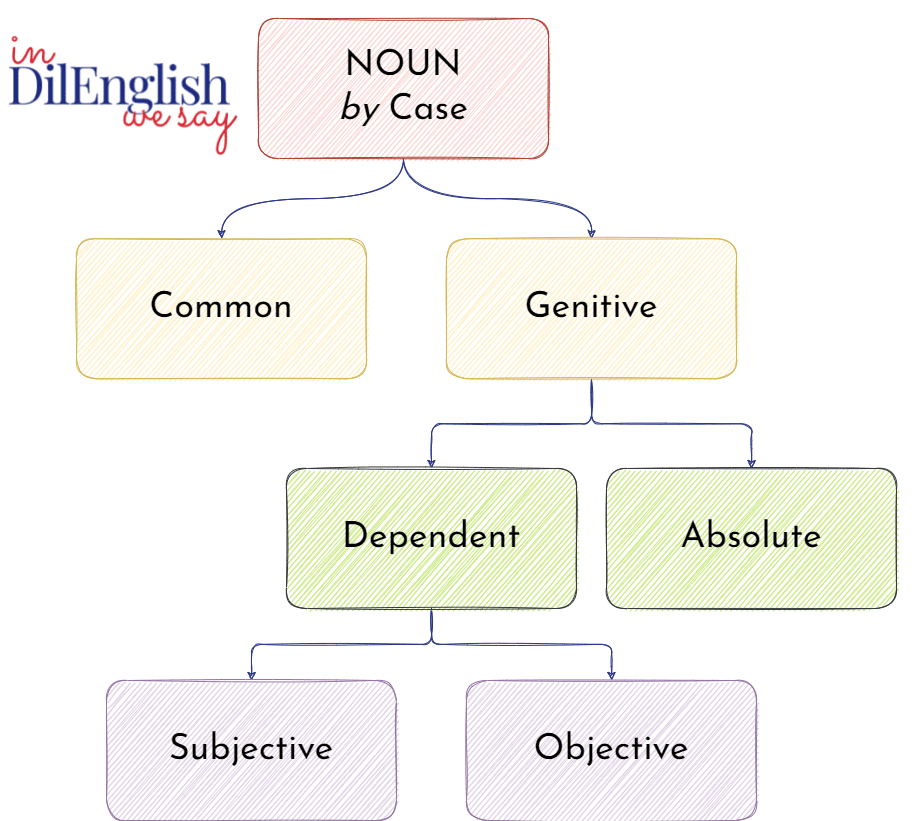The case indicates the relations of the noun (or pronoun) to the other words in the sentence.
English nouns denoting living beings (and some nouns denoting lifeless things) have two cases, an uninflected form called the common case and an inflected form called the genitive case.

Genitive Case
The genitive case is formed by adding -’s (the apostrophe s) to the noun in the singular and only ’ (the apostrophe) to plural forms ending in – s.
| Singular | Plural |
| a girl’s book | a girls’ school |
| Singular | Plural |
| a man’s hat | men’s hats |
Sometimes the apostrophe s may refer to a whole group of words (the group-genitive):
Jane and Mary’s room.
The last word of the group need not even be a noun:
I shall be back in an hour or two’s time.
As to its use the genitive case falls under:
- The Dependent Genitive.
- The Absolute Genitive.
Dependent Genitive Case
The Dependent Genitive is used with the noun it modifies and comes before it. The chief meaning of the genitive case is that of possession:
…a young man and a girl came out of the solicitor’s office. (Braine)
He stayed at Fanny’s flat. (Aldington)
Very close to the meaning of possession is that of a part to a whole:
A faint smile had come on Victorine’s face — she was adding up the money she might earn. (Galsworthy)
His sister’s eyes fixed on him with a certain astonishment, obliged him at last to look at Fleur. (Galsworthy)
The Dependent Genitive may express the doer of an action (the so-called subjective genitive) or show that some person is the object of the action (the so-called objective genitive):
It was Tom’s step, then, that Maggie heard on the steps. (Eliot)
Gwendolen’s reception in the neighborhood fulfilled her uncle’s expectations. (Eliot)
The noun in the genitive case may denote qualitative relations:
He looked ever so much smarter in his new officer’s clothes with the little blue chevron… (Aldington)
The use of the genitive case of nouns denoting inanimate things and abstract notions is rather limited. The genitive case of nouns denoting inanimate things may denote the relations between a part and the whole.
…the sudden shaking of an aspen’s leaves in the puffs of breeze that rose along the river… (Galsworthy)
He stepped on the truck’s running board hanging on with his left arm. (Heym)
The genitive case of nouns expressing time, space, and weight is widely used.
From the depot he was sent to the officers’ training camp with two days’ leave. (Aldington)
They both quite took to him again and during his month’s leave gave him a good time. (Aldington)
There is a remnant still of the last year’s golden clusters… (Eliot)
The three of us had had dinner, and walked down past the theatre to the river’s edge. (Snow)
Absolute Genitive Case
The Absolute Genitive may be used without any noun or be separated from the noun it modifies. The Absolute Genitive may be used anaphorically.
Mrs. Moss’s face bore a faded resemblance to her brother’s. (Eliot)
The face Michael drew began by being Victorine’s and ended by being Fleur’s. (Galsworthy)
The Absolute Genitive may have local meaning: the stationer’s, the baker’s, the tobacconist’s, my uncle’s, etc.
On her way home she usually bought a slice of honey-cake at the baker’s. (Mansfield)
“My dear,” said the lace collar she secured from Partridge’s, “I fit you beautifully.” (Dreiser)
The Absolute Genitive may be introduced by the preposition of.
She is a relation of the Colonel’s. (Austen)
